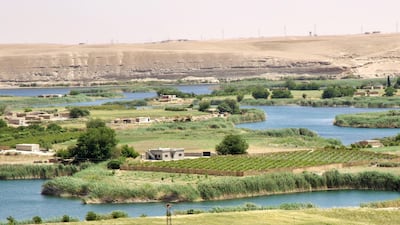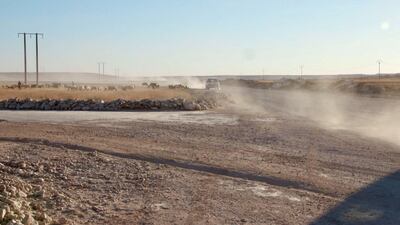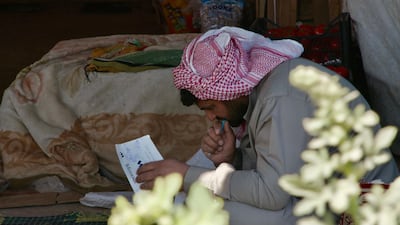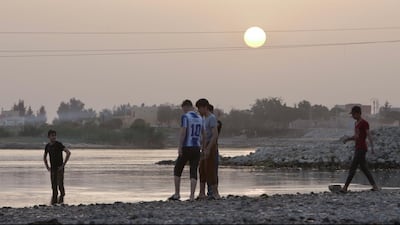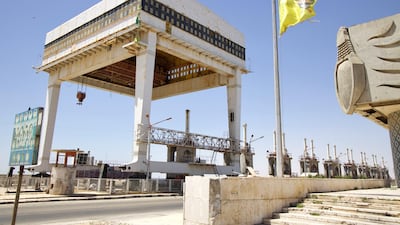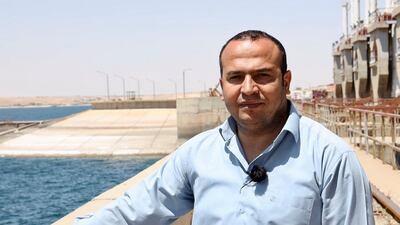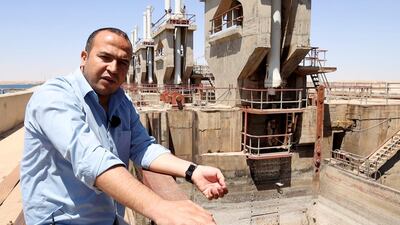May is usually a month of plenty in Raqqa, as the Euphrates river feeds crops and brings relief from the rising summer heat.
But this year, the 2,800-kilometre-long river that originates in Turkey and crosses through Syria and Iraq to finish its course in the Arabian Gulf, has depleted to dramatically low levels. The shortage is threatening to stymy efforts to rebuild the area after ISIS was driven out in October 2017.
Global warming, wasting resources and the destruction of infrastructure have all weakened the flow from Turkey, said Abdul Razzaq Al Allawi, a former director of the maintenance department for the Euphrates rivers in Syria. But the issue is also geopolitical.

Turkey, which controls the source of the river, has built around 20 dams in its territory since the 1970s as part of its Southeast Anatolia Project, commonly known by its Turkish acronym GAP, to provide farm irrigation and power.
“I am 46 years old, I was born in Raqqa and I have never seen the river so low,” said Hussein Aboud, who has come to the banks of the river to cool off on a hot afternoon.
The marks he indicates on the banks show a dramatic decrease. The width of the stream has halved to 10 metres in four months, revealing new islands.
“The whole city is just recovering from the war," continues Hussein, sitting on a plastic chair with his feet in the water. "With the water receding, everyone suffers again. My land became too dry to be cultivated.”
A little further downstream, a man driving a tractor has come with his two sons to fill a cistern.
"How are we going to survive?” he wonders.
The consequences for the population are dramatic, said Osama Khalaf, spokesperson for the Raqqa municipality council.
Most of the drinking water comes from the river. Agriculture and livestock are totally dependent on it. The herds of buffalos raised on the banks of the Euphrates are now decimated by diseases.
“Fishing is also affected,” he said. "Desertification is rapidly progressing. It will take us back 40 years in terms of access to water."
The Euphrates also provides 90 per cent of the city's electricity.
Experts say water flow has reduced to 200 cubic metres per second from 500 cubic metres per second since the start of the year.
Despite protests from neighbouring countries, Turkey has refused to discuss co-management of resources in recent years.
West of Raqqa, going upstream along the Euphrates, displaced families are living in tents.
Mohammed Mohsen and members of his tribe arrived from Hama, an area held by the Syrian regime, and settled in Al Sahabiya.
“We came here with no turning back,” Mr Mohsen said, sitting in a tent and wearing a white djellabah with a red traditional scarf around his head. "Since last year, the water has been reduced and we will have to use pumps for our crops. If this situation continues, everyone will move again, a little further."
Ankara is also facing a particularly dry spring and its reserves are dwindling. But Syria and Iraq denounce Ankara's water hegemony.
“Turkey wants to weaken the Kurdish administration in northern Syria,” Mr Khalef claims. "People will end up turning against it if the water runs out. The drying up is a deliberate strategy on Ankara's part.
Under the Raqqa Bridge, this opinion is widely shared.
“It's all because of Erdogan,” said Ibrahim Hassan, 53. A hulking man with a thick black beard, he comes to the Euphrates to throw his net and try his luck catching a few carp.

“The level is decreasing day by day,” the father of nine said. "It is a way of thirsting the population to make it support Turkey. Raqqa is under the control of the Syrian Democratic Forces and they cannot stand it."
Turkey has made no recent statements on why is it restricting the river.
In 1987, Turkey, Syria and Iraq signed an agreement in which Turkey pledged Syria would receive a minimum of 500 cubic metres of water per second and in turn, Syria would allow 60 per cent of that water to flow to Iraq.

The SDF, and also the Syrian government, which controls the right bank of the Euphrates, has called on Turkey to open the floodgates of their dams to release water.
Raqqa’s drinking water is provided by Tabqa dam, located 40 kilometres upstream. Since December, the water level in the reservoir has dropped by more than five metres.
The monumental dam, built by the Soviet Union in the 1970s, supplies seven million people with water and a large part of northern Syria with electricity. Of the eight turbines, four are still in working order. The others were destroyed by ISIS.
When The National visited earlier this month, only one was active as the flow of the river had weakened.
Most of Raqqa's neighbourhoods now only have six to eight hours of electricity per day. The old generators that run on diesel, at a cost that few can afford, have reappeared on the streets.
The power used to produce electricity is 120 MW, compared to the usual 450, said Welat Derwish, the regional director of water administration.
"It's worse than the previous crisis," he said. "If this continues, we will have to stop the last turbine in two months. This river is a historical link between communities and civilizations. Turkey is fighting us with the weapon of water."
